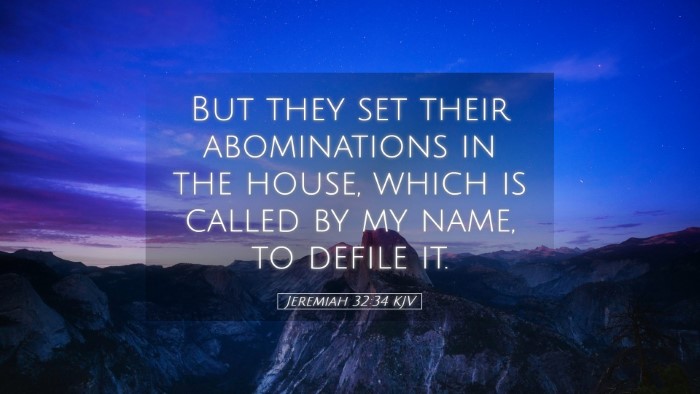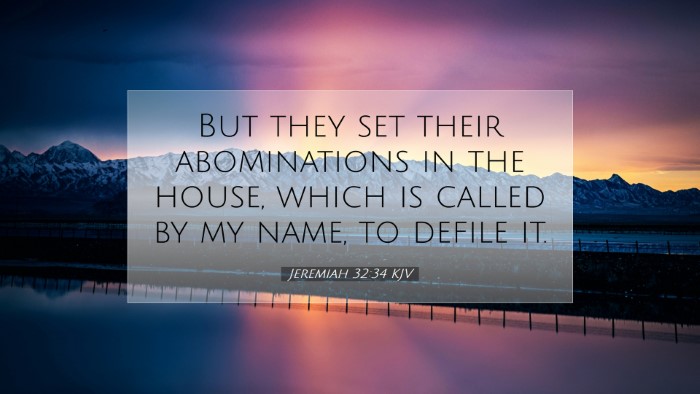Commentary on Jeremiah 32:34
Jeremiah 32:34 states: "But they set their abominations in the house, which is called by my name, to defile it." This verse is embedded in a rich historical and theological context that requires deep exploration through the lens of various public domain commentaries.
Contextual Background
The book of Jeremiah is characterized by its dual focus on the impending judgment of Judah and the promise of restoration. Jeremiah prophesied during the final days of the kingdom of Judah as the Babylonians encroached. In this specific passage, the prophet highlights the grievous sins of the people, particularly their idolatrous practices within the temple, which was supposed to be a sacred space devoted to the worship of Yahweh.
Theological Significance
This verse illustrates a significant violation of covenant fidelity. The temple, as the dwelling place of God's name, represents His presence among His people. The perversion of this space by introducing abominations speaks to a profound act of disobedience and rejection of God's holiness.
Insights from Matthew Henry
- Idolatry and Its Consequences: Matthew Henry emphasizes that the actions of the people in defiling the temple indicate a deep spiritual corruption. He argues that their idolatry was not merely a private affair but affected the communal relationship with God.
- Divine Judgment: Henry notes that such abominations provoke divine wrath. The sacred space of the temple was meant to inspire reverence; thus, when it is desecrated, it brings about judgment, a recurring theme throughout prophetic literature.
Insights from Albert Barnes
- Literal and Symbolic Interpretation: Barnes interprets the "set of abominations" both literally and symbolically. He points to the immediate practices, such as idol worship, as well as the broader spiritual decline of the nation.
- God’s Holiness: Barnes argues that the defilement of the temple signifies a rejection of God's holiness. The phrase "called by my name" signifies a claim of ownership, and the transgression against that claim underscores the seriousness of sin.
Insights from Adam Clarke
- Contextualizing Abominations: Clarke provides a detailed analysis of the term "abominations," linking it to specific practices that were contradictory to the law prescribed to the Israelites. He highlights that these acts were not only frequent but institutionalized among the people.
- Call to Repentance: Clarke emphasizes the importance of recognizing the severity of sin. He encourages readers to understand that such defilement calls for sincere repentance and a return to true worship as prescribed by God.
Pastoral Reflections
This passage offers vital lessons for pastors and church leaders today. The importance of maintaining the holiness of worship spaces cannot be overstated. Just as in ancient Israel, the church must guard against practices that could dilute or defile the true essence of worship. This text serves as a reminder of the sacredness of what is dedicated to God.
Applications for Modern Believers
- Examination of Heart: Believers are called to examine their own hearts and practices, ensuring that they are aligned with God's standards. Personal and corporate repentance remains an essential aspect of spiritual life.
- Prioritizing Holiness: The church today must emphasize a culture of holiness, both in personal lives and in communal gatherings, learning from Israel’s neglect of worship that led to grave consequences.
- Understanding Consequences: Just as Judah faced judgment for their actions, modern believers must be aware that deviation from God's ways can lead to spiritual decline and disconnection from the divine presence.
Concluding Thoughts
Jeremiah 32:34 challenges believers to reflect on their commitments to God and the purity of their worship. The abominations that led to the defilement of the temple are echoed in the necessity for contemporary followers of Christ to protect their faith and the communal worship experience from similar pitfalls. The call to holiness rings true today just as it did in the days of Jeremiah.


